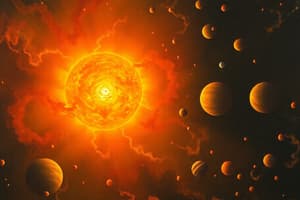Podcast
Questions and Answers
List the four planets closest to the sun.
List the four planets closest to the sun.
Mercury, Venus, Earth, and Mars.
Mercury, Venus, Earth, and Mars together are called what kind of planets?
Mercury, Venus, Earth, and Mars together are called what kind of planets?
They are called the inner planets.
Are the inner planets larger or smaller than most of the other planets in our solar system?
Are the inner planets larger or smaller than most of the other planets in our solar system?
Smaller.
Describe the kind of rock all of the inner planets formed from.
Describe the kind of rock all of the inner planets formed from.
How are the inner planets different?
How are the inner planets different?
Which planet is most like Earth?
Which planet is most like Earth?
The four planets farthest from the sun are called the __________ planets.
The four planets farthest from the sun are called the __________ planets.
Define gas giant.
Define gas giant.
Name the largest planet in our solar system.
Name the largest planet in our solar system.
What is the name of a huge storm in Jupiter's atmosphere?
What is the name of a huge storm in Jupiter's atmosphere?
Jupiter rotates so quickly that one day is equal to how many hours long?
Jupiter rotates so quickly that one day is equal to how many hours long?
What three things are Saturn's rings made up of?
What three things are Saturn's rings made up of?
What gives Uranus its beautiful blue-green color?
What gives Uranus its beautiful blue-green color?
What year was Uranus discovered and who discovered it?
What year was Uranus discovered and who discovered it?
Of the four gas giants, which one is the smallest or the fourth largest?
Of the four gas giants, which one is the smallest or the fourth largest?
How is Neptune different from the other outer planets?
How is Neptune different from the other outer planets?
Wind can blow at how many kilometers an hour?
Wind can blow at how many kilometers an hour?
Pluto was once known as the __________ planet.
Pluto was once known as the __________ planet.
How is Pluto classified today?
How is Pluto classified today?
Pluto is much like a planet, but it is much larger or much smaller?
Pluto is much like a planet, but it is much larger or much smaller?
What two materials is Pluto made of?
What two materials is Pluto made of?
List two reasons scientists agree Pluto should no longer be considered a planet.
List two reasons scientists agree Pluto should no longer be considered a planet.
How is Pluto's orbit different from those of the other planets?
How is Pluto's orbit different from those of the other planets?
Rings around planets are formed by what materials?
Rings around planets are formed by what materials?
True or false: Planets that are close to the sun orbit faster than outer planets?
True or false: Planets that are close to the sun orbit faster than outer planets?
Which of the following planets is not one of the outer planets? Jupiter, Uranus, Neptune or Mars?
Which of the following planets is not one of the outer planets? Jupiter, Uranus, Neptune or Mars?
Earth is different than other planets because it contains __________?
Earth is different than other planets because it contains __________?
Bonus: List three reasons that explain why humans could not survive on Neptune.
Bonus: List three reasons that explain why humans could not survive on Neptune.
Flashcards are hidden until you start studying
Study Notes
Inner Planets
- The four inner planets are Mercury, Venus, Earth, and Mars.
- Inner planets are smaller compared to most planets in the solar system.
- All inner planets formed from dense rock materials.
- Differences among inner planets: Earth has one moon, Mars has two moons, while Venus and Mercury have none.
- Mars is considered the planet most similar to Earth.
Outer Planets
- The four outer planets (farthest from the sun) are Jupiter, Saturn, Uranus, and Neptune.
- Outer planets are often classified as gas giants, mainly composed of gases.
- Jupiter is the largest planet in the solar system.
- The Great Red Spot is a massive storm in Jupiter's atmosphere.
- Jupiter's rapid rotation results in a day lasting only 10 hours.
Saturn's Features
- Saturn's rings consist of ice, dust, and rocks.
Uranus and Neptune
- Uranus has a blue-green color due to methane gas in its atmosphere.
- Discovered in 1781 by William Herschel, Uranus is the first planet found with a telescope.
- Neptune is the smallest gas giant and has fewer moons compared to other outer planets.
- Winds on Neptune can reach speeds of up to 1,450 kilometers per hour.
Pluto's Classification
- Once considered the ninth planet, Pluto is now classified as a dwarf planet due to its small size and irregular orbit.
- Pluto is primarily composed of rock and ice.
- Two reasons Pluto is not classified as a planet: its small size relative to other planets and its orbit, which crosses that of Neptune approximately every 248 years.
- Pluto's orbit is oval-shaped and intersects another planet's orbit.
Planetary Rings
- Rings around planets are formed from rock, ice, and dust.
Orbital Characteristics
- Planets closer to the sun orbit faster than those further away.
Additional Facts
- Mars is not categorized as an outer planet.
- Earth is unique among planets due to its presence of liquid water.
- Humans cannot survive on Neptune because it lacks oxygen, has no liquid water, and is too distant from the sun for plants to generate energy.
Studying That Suits You
Use AI to generate personalized quizzes and flashcards to suit your learning preferences.




